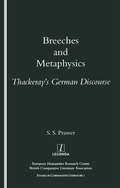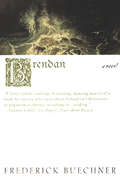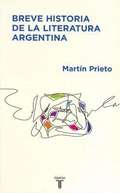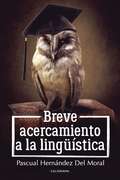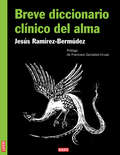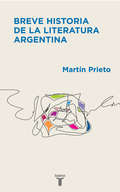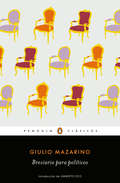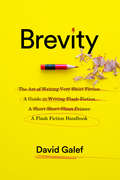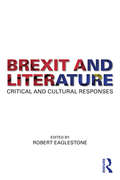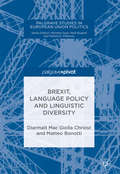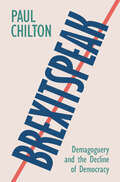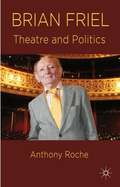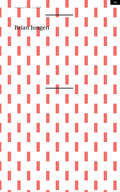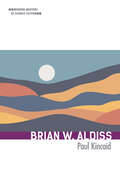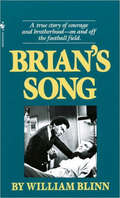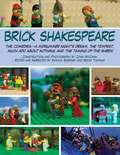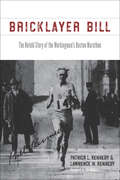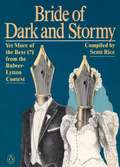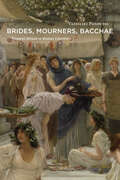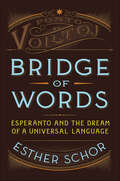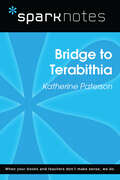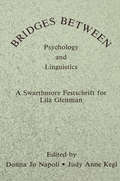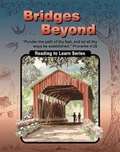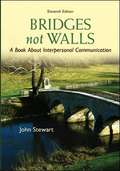- Table View
- List View
Breeches and Metaphysics: Thackeray's German Discourse
by S. S. Prawer"This study traces the successive stages of Thackeray's contact with the German world and analyses the discourse he developed as a result. The author is concerned with the fiction and criticism of Thackeray's :Paris Sketch Book"" and the impressions related by the cockney traveller in ""Irish Sketch Book"" and ""Notes of a Journey from Cornhill to Grand Cairo"". Thackeray's own pictorial illustrations of his writings and those by Cruikshank, Doyle and Walker, which he supervised and supplemented, are recognized as an integral part of his German discourse. The study is a chronological one, setting Thackeray's construction of ""German"" and ""the Germans"" against the background of his own development and of the social, industrial, cultural and political history of Britain and its continental neighbours."
Brendan
by Frederick BuechnerAn acclaimed author interweaves history and legend to re-create the life of a complex man of faith fifteen hundred years ago. Winner of the 1987 Christianity and Literature Book Award for Belles-Lettres.
Bret Easton Ellis
by Georgina ColbyThis book reads the whole of Bret Easton Ellis's oeuvre to date from "Less Than Zero" to "Imperial Bedrooms. "Colby recasts Ellis as a social critic anda literary figure who enables us to think differently about the cultural climates of the 1980s, 1990s, and the first decade of the twenty-first century. "
Breve Historia de la Literatura Argentina
by Martín PrietoEste libro ofrece al lector una historia informativa, descriptiva, explicativa, crítica y valorativa de la literatura argentina, desde las crónicas escritas sobre el territorio que más de tres siglos después ocupará la República Argentina hasta la producción literaria actual. La decisión de condensar todos estos contenidos en un volumen requiere necesariamente exclusiones y recortes. La obra, guiada por criterios claros y comprometidos, da cuenta de los principales textos, autores, movimientos, tendencias y géneros que dibujan el corpus literario argentino en forma sucinta pero rigurosa y funcional. Escrita por un solo autor -un especialista con perspectivas y juicios sólidos y definidos-, goza de una unidad y una coherencia que la hacen un útil instrumento para un público amplio, no restringido a los expertos, objetivo al que apunta también su lenguaje claro y despojado de tecnicismos. Dejando de lado otros criterios, esta Breve historia... elige poner el eje en el valor literario de los textos -ya resida éste en su dimensión estética, su novedad o su proyección-, constituyendo así un instrumento decisivo para conocer, valorar y disfrutar la literatura argentina.
Breve acercamiento a la lingüística
by Pascual Hernández del MoralEl lenguaje es lo que nos hace humanos. En este Breve acercamiento a la lingüística general se ha pretendido hacer un repaso a las diferentes teorías que se han sucedido a lo largo del tiempo, a través de la obra de los distintos lingüistas, a los que se les cita a través de sus obras, lo que, a veces hace al texto un tanto enojoso. <P><P>Tras hacer un repaso a las generalidades del lenguaje y de la lengua, como entidades distintas, y apuntar las principales características que definen ambos conceptos, se acerca a una definición de la lingüística como disciplina, que intenta unir la explicación del lenguaje y de la lengua, a través del término Lingüística General y de las ciencias afines que aportan conceptos esenciales a la disciplina lingüística. <P>Presenta una breve historia de la lingüística desde el siglo III a.C., hasta principios del siglo XXI, presentando, a través de los principales autores, los fundamentos de las superaciones teóricas de la teoría lingüística. Se acaba con un glosario de los términos más importantes, presentados a través de las distintas acepciones que los autores les han dado.
Breve diccionario clínico del alma
by Jesús Ramírez-BermúdezUn audaz ensayo sobre las profundas relaciones entre la literatura y la psiquiatría, a través de la narración de varios casos clínicos. Breve diccionario clínico del alma es una aproximación al complejo fenómeno de las enfermedades del cerebro y la mente. Mediante casos clínicos, notas históricas y reflexiones filosóficas, el diccionario aborda los enigmas de la neuropsiquiatría contemporánea, como la autoscopía, los delirios de parasitosis, las alucinaciones visuales de las personas ciegas, los síndromes de Cotard y Capgras. Más que una explicación definitiva, Jesús Ramírez-Bermúdez plantea las interrogantes diarias del trabajo clínico, así como el intenso debate entre ciencias y humanidades en torno a problemas descritos desde la antigüedad, como la manía, la melancolía y la epilepsia, o frente a los conceptos que forman la psicopatología moderna: esquizofrenia, paranoia, delirios, obsesiones. Con los recursos de la narrativa, la reflexión filosófica y el rigor científico, el Breve diccionario clínico del alma explora la correspondencia oculta entre la creatividad artística y la enfermedad mental, entre la filosofía de la mente y la neurología de la conducta, entre la ciencia y el arte.
Breve historia de la literatura argentina
by Martín PrietoLa obra, guiada por criterios claros y comprometidos, da cuenta de los principales textos, autores, movimientos, tendencias y géneros que dibujan el corpus literario argentino en forma sucinta pero rigurosa y funcional. Este libro ofrece al lector una historia informativa, descriptiva, explicativa, crítica y valorativa de la literatura argentina, desde las crónicas escritas sobre el territorio que más de tres siglos después ocupará la República Argentina hasta la producción literaria actual. La decisión de condensar todos estos contenidos en un volumen requiere necesariamente exclusiones y recortes. Escrita por un solo autor -un especialista con perspectivas y juicios sólidos y definidos-, goza de una unidad y una coherencia que la hacen un útil instrumento para un público amplio, no restringido a los expertos, objetivo al que apunta también su lenguaje claro y despojado de tecnicismos. Dejando de lado otros criterios, esta Breve historia elige poner el eje en el valor literario de los textos -ya resida éste en su dimensión estética, su novedad o su proyección-, constituyendo así un instrumento decisivo para conocer, valorar y disfrutar la literatura argentina.
Breviario para políticos
by Giulio MazarinoLos mejores libros jamás escritos. «Solo el azar determina las acciones de los hombres.» El cardenal Giulio Mazarino presenta en su Breviario para políticos una particular concepción sociopolítica de la época que le tocó vivir y eligió protagonizar. Desarrolla así, escueta y precisamente, un agudo análisis de la condición humana. A lo largo de sus páginas, se ofrecen al lector directrices y consejos de un pragmatismo atroz, lindante de la inmoralidad, cuyo único objetivo es la obtención de más y más poder. Inteligente, aguda y, por encima de todo, tremendamente sincera, la presente es una obra imprescindible para historiadores, para literatos y, por supuesto, para políticos. En la palpitante versión de María Pons Irazazábal, este lacerante epítome se revela no solo como el retrato de uno de los hombres más poderosos de su tiempo, sino, en palabras del maestro Umberto Eco, firmante de la introducción que abre el volumen, como «un retrato robot de uso diario, para vuestra actividad cotidiana».
Brevity: A Flash Fiction Handbook
by David GalefIn Brevity, David Galef provides a guide to writing flash fiction, from tips on technique to samples by canonical and contemporary authors to provocative prompts that inspire powerful stories in a little space. Galef traces the genre back to its varied origins, from the short-short to nanofiction, with examples that include vignettes, prose poems, character sketches, fables, lists, twist stories, surrealism, and metafiction. The authors range from the famous, such as Colette and Borges, to today's voices, like Roxane Gay and Bruce Holland Rogers. A writer and longtime creative writing teacher, Galef also shows how flash fiction skills translate to other types of writing. Brevity is an indispensable resource for anyone working in this increasingly popular form. For more information, see davidgalef.com/brevity.
Brexit and Literature: Critical and Cultural Responses
by Robert EaglestoneBrexit is a political, economic and administrative event: and it is a cultural one, too. In Brexit and Literature, Robert Eaglestone brings together a diverse range of literary scholars, writers and poets to respond to this aspect of Brexit. The discipline of ‘English’, as the very name suggests, is concerned with cultural and national identity: literary studies has always addressed ideas of nationalism and the wider political process. With the ramifications of Brexit expected to last for decades to come, Brexit and Literature offers the first academic study of its impact on and through the humanities. Including a preface from Baroness Young of Hornsey, Brexit and Literature is a bold and unapologetic volume, focusing on the immediate effects of the divisive referendum while meditating on its long-term impact.
Brexit, Language Policy and Linguistic Diversity (Palgrave Studies in European Union Politics)
by Diarmait Mac Giolla Chríost Matteo BonottiThis book argues that Brexit will wholly re-shape the legal framework and public policy norms relating to linguistic diversity that have dominated public life in the UK and the EU since the Treaty on European Union in 1993. First, Brexit de-anchors the linguistic actors engaged with sub-state nationalisms in the UK (in Northern Ireland, Wales and Scotland) from the ethno-linguistic imaginary of the so-called ‘Europe of the regions’. This strengthens the case both for the de jure recognition of English as the official language of the UK and for embedding autochthonous minority language rights and freedoms in a transformed UK constitution. Second, Brexit strengthens the normative case for English as the lingua franca of the EU, by reducing the injustices associated with the rise of English as the EU and global lingua franca. The book will appeal to students and scholars across the fields of political science, political theory, law, language policy and planning, and sociolinguistics.
Brexitspeak: Demagoguery and the Decline of Democracy
by Paul ChiltonWere we talked into Brexit? And who is 'we'? It's impossible to do politics without words and a context to use them in. And it's impossible to make sense of the phenomenon of Brexit without understanding how language was used – and misused – in the historical context that produced the 2016 referendum result. This interdisciplinary book shows how the particular idea of 'the British people' was maintained through text and talk at different levels of society over the years following World War II, and mobilised by Brexit propagandists in a socially, economically and culturally divided polity. The author argues that we need the well-defined tools of linguistics and language philosophy, tied in with a political science framework, to understand a serious, modern concept of demagoguery. Written in an accessible manner, this book is essential reading for anyone who wants to probe the social, political and ideational contexts that generated Brexit.
Brian Friel
by Anthony RocheFriel is recognised as Ireland's leading playwright and due to the ability of plays like Translations and Dancing at Lughnasa to translate into other cultures he has made a major impact on world theatre. This study draws on the Friel Archive to deepen our understanding of how his plays were developed.
Brian Jungen
by Clint Burnham Zoë Gray Brian Jungen Solange De Boer Homi BhabhaPublication initially published in print on the occasion of the exhibition Brian Jungen at Witte de With, 2 Dec 2006 to 11 Feb 2007.
Brian W. Aldiss (Modern Masters of Science Fiction)
by Paul KincaidBrian W. Aldiss wrote classic science fiction novels like Report on Probability A and Hothouse. Billion Year Spree, his groundbreaking study of the field, defined the very meaning of SF and delineated its history. Yet Aldiss’s discomfort with being a guiding spirit of the British New Wave and his pursuit of mainstream success characterized a lifelong ambivalence toward the genre. Paul Kincaid explores the many contradictions that underlay the distinctive qualities of Aldiss’s writing. Wartime experiences in Asia and the alienation that arose upon his return to the cold austerity of postwar Britain inspired themes and imagery that Aldiss drew upon throughout his career. He wrote of prolific nature overwhelming humanity, believed war was madness even though it provided him with the happiest period of his life, and found parallels in the static lives of Indian peasants and hidebound English society. As Kincaid shows, contradictions created tensions that fueled the metaphorical underpinnings of Aldiss's work and shaped not only his long career but the evolution of postwar British science fiction.
Brian's Song
by William BlinnTwo men. One named Gale Sayers, the other Brian Piccolo. They came from different parts of the country. They competed fiercely for the same job. One liked to talk; the other was shy. One was white; the other black. This is the story of how they came to know each other, fight each other, and help each other
Brick Shakespeare: The Comedies - A Midsummer Night's Dream, The Tempest, Much Ado About Nothing, and The Taming of the Shrew
by Becky Thomas Monica Sweeney John McCannExplore four of Shakespeare’s comedies like never before-with LEGO bricks! This book presents Shakespeare’s most delightful comedies, A Midsummer Night’s Dream, Much Ado About Nothing, The Taming of the Shrew, and The Tempest, in one thousand amazing color photographs. This unique adaptation of the world’s most famous plays stays true to Shakespeare’s original text, while giving audiences an exciting new perspective as the stories are retold with the universally beloved construction toy.Get caught up in hilarious misadventures as brick Puck leads the lovers astray through the brick forests of Athens. Watch Cupid kill with traps in the plot to marry Beatrice and Benedict. Marvel at the changing disguises of the men vying for brick Bianca’s affections, and feel the churn of the ocean as Prospero sinks his brother’s ship into the brick sea. These iconic stories jump off the page with fun, creative sets built brick by brick, scene by scene!This incredible method of storytelling gives new life to Shakespeare’s masterpieces. With an abridged form that maintains original Shakespearean language and modern visuals, this ode to the Bard is sure to please all audiences, from the most versed Shakespeare enthusiasts to young students and newcomers alike!
Bricklayer Bill: The Untold Story of the Workingman's Boston Marathon
by Patrick L. Kennedy Lawrence W. KennedyTwo weeks after the United States officially entered World War I, Irish American "Bricklayer Bill" Kennedy won the Boston Marathon wearing his stars-and-stripes bandana, rallying the crowd of patriotic spectators. Kennedy became an American hero and, with outrageous stories of his riding the rails and sleeping on pool tables, a racing legend whose name has since appeared in almost every book written on the Boston Marathon. When journalist Patrick Kennedy and historian Lawrence Kennedy unearthed their uncle's unpublished memoir, they discovered a colorful character who lived a tumultuous life, beyond his multiple marathons. The bricklayer survived typhoid fever, a five-story fall, auto and train accidents, World War action, Depression-era bankruptcy, decades of back-breaking work, and his own tendency to tipple. In many ways, Bill typified the colorful, newly emerging culture and working-class ethic of competitive long-distance running before it became a professionalized sport. Bricklayer Bill takes us back to another time, when bricklayers, plumbers, and printers could take the stage as star athletes.
Bride of Dark And Stormy: Yet More of the Best (?) from the Bulwer-lytton Contest
by Scott RiceIt's not easy to write bad fiction. On purpose. Scott Rice, organizer of the Bulwer-Lytton contest, asks people to do just that. Here are the best opening sentences of the worst hypothetical novels never written. <P><P> Just try to understand the 1987 winner: <P><P>"The notes Matted skyward as the sun rose over the Canada geese, feathered rumps mooning the day, webbed appendages frantically pedaling unseen bicycles in their search for sustenance, driven by cruel Nature's maxim, 'ya wanna eat, ya gotta work,' and at last I knew Pittsburgh." <P><P> But Bride of Dark and Stormy is not just a compilation. Now Scott Rice has added his own advice on how to write "successful" fiction in the Bulwer-Lytton mode, making this a perverse how-to book, full of rotten advice and worse examples.
Brides, Mourners, Bacchae: Women's Rituals in Roman Literature
by Vassiliki PanoussiHow does the treatment of women's rituals in Latin poetry and prose reveal Roman ideas of female agency?Powerful female characters pervade both Greek and Latin literature, even if their presence is largely dictated by the narratives of men. Feminist approaches to the study of women in Greek literature have helped illustrate the importance of their religious and ritual roles in public life—Latin literature, however, has not been subject to similar scrutiny. In Brides, Mourners, Bacchae, Vassiliki Panoussi takes up the challenge, exploring women's place in weddings, funerals, Bacchic rites, and women-only rituals. Panoussi probes the multifaceted ways women were able to exercise influence, even power, in ancient Rome from the days of the late Republic to Flavian times. Systematically investigating both poetry and prose, Panoussi covers a wide variety of genres, from lyric poetry (Catullus), epic (Ovid, Lucan, Valerius, Statius), elegy (Propertius, Ovid), and tragedy (Seneca) to historiography (Livy) and the novel (Petronius).The first large-scale analysis of this body of evidence from a feminist perspective, the book makes a compelling case that female ritual was an important lens through which Roman authors explored the problems of women's agency, subjectivity, civic identity, and self-expression. By focusing on the fruitful intersection of gender and religion, the book elucidates not only the importance of female religious experience in Rome but also the complexity of ideological processes affecting Roman ideas about gender, sexuality, family, and society. Brides, Mourners, Bacchae will be of value to scholars of classics and ancient religions, as well as anyone interested in the study of gender in antiquity or the connection between religion and ideology.
Bridge of Words: Esperanto and the Dream of a Universal Language
by Esther SchorA rich and passionate biography of a language and the dream of world harmony it sought to realizeIn 1887, Ludwig Lazarus Zamenhof, a Polish Jew, had the idea of putting an end to tribalism by creating a universal language, one that would be equally accessible to everyone in the world. The result was Esperanto, a utopian scheme full of the brilliance, craziness, and grandiosity that characterize all such messianic visions.In this first full history of a constructed language, poet and scholar Esther Schor traces the life of Esperanto. She follows the path from its invention by Zamenhof, through its turn-of-the-century golden age as the great hope of embattled cosmopolites, to its suppression by nationalist regimes and its resurgence as a bridge across the Cold War. She plunges into the mechanics of creating a language from scratch, one based on rational systems that would be easy to learn, politically neutral, and allow all to speak to all. Rooted in the dark soil of Europe, Esperanto failed to stem the continent's bloodletting, of course, but as Schor shows, the ideal continues draw a following of modern universalists dedicated to its visionary goal.Rich and subtle, Bridge of Words is at once a biography of an idea, an original history of Europe, and a spirited exploration of the only language charged with saving the world from itself.
Bridge to Terabithia (SparkNotes Literature Guide Series)
by SparkNotesBridge to Terabithia (SparkNotes Literature Guide) by Katherine Paterson Making the reading experience fun! Created by Harvard students for students everywhere, SparkNotes is a new breed of study guide: smarter, better, faster.Geared to what today's students need to know, SparkNotes provides:chapter-by-chapter analysis explanations of key themes, motifs, and symbols a review quiz and essay topicsLively and accessible, these guides are perfect for late-night studying and writing papers.
Bridges Between Psychology and Linguistics: A Swarthmore Festschrift for Lila Gleitman
by Donna Jo Napoli Judy Anne KeglWritten as a tribute to Lila Gleitman, an influential pioneer in first language acquisition and reading studies, this significant book clearly establishes the relationships between psychology and linguistics. It begins with a thorough examination of issues in developmental psychology, continues with questions on perception and cognition, studies the realm of psycholinguistics, and concludes with an exploration of theoretical linguistics.
Bridges Not Walls: A Book About Interpersonal Communication
by John StewartSince the first edition in 1973, Bridges Not Walls has examined the power and promise of interpersonal communication in intimate relationships, families, communities, and cultures. The text presents a broad range of scholarly and popular articles drawn from several disciplines, including communication, psychology, and philosophy, all chosen for their understandability and practical applicability. Within these readings are thought-provoking discussions of interpersonal contact, identity-management, verbal and nonverbal cues, perception, listening, assertiveness and self-disclosure, family communication, intimacy and social support, defensiveness and hurtful communication, conflict management, culture, and dialogue. Together, the readings emphasize the social and relational elements of human communication, the overlapping influence of verbal and nonverbal cues, the prominence of culture, and the close connection between quality of communication and quality of life.
